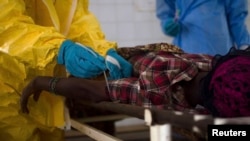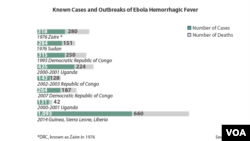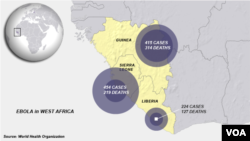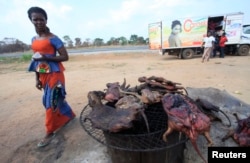The rapidly spreading Ebola outbreak in West Africa is the deadliest ever, health officials say.
Guinea, Sierra Leone, and Liberia have reported hundreds of cases since March this year and more than 1,000 deaths. Nigeria is on high alert after the first known case was reported in Lagos.
As of July 20, some 1,093 people in the region have been infected, according to the World Health Organization. At least 660 of those people have died.
Africa's most populous country, Nigeria, is bracing for an outbreak after a Liberian man hospitalized with Ebola in Lagos died last week. Liberia is closing most of its borders.
The Nigerian government is currently working to identify every person who came into contact with Patrick Sawyer during his journey from Liberia to Nigeria early last week. Sawyer, 40, was a consultant for the country's finance ministry and he was immediately quarantined in Lagos upon arrival.
But State Heath Commissioner Jide Idris says many more people may have had contact with Sawyer than is currently known. According to Idris, the first plane Sawyer traveled on stopped briefly in Ghana before going on to Togo, where he switched planes. He said the airline has not provided a manifest for the first two flights.
Both the Nigerian health and aviation departments are still searching, but so far, Idris said they are not aware of any other potential Ebola cases.
“We call on all Nigerians to be calm and not to panic and do hereby ensure them that both the state and the federal government are up in arms to ensure that the virus does not escape and that no Nigerian is infected with this virus," he said.
Doctor infected
“Ebola is an incredibly dangerous, deadly disease,” noted Melissa Strickland, spokesperson for the international relief group Samaritan’s Purse, one of whose medical doctors was struck down with the illness while caring for patients at a facility in Liberia.
“Just a little while ago, Dr. Kent Brantly’s condition was stable,” she said. “His fever is fluctuating. He has body aches, pains, the typical Ebola symptoms. He’s receiving intensive medical care from our team on the ground and we are hopeful for his recovery.”
Kent Brantly, 33, contracted the disease despite taking every precaution against it.
“Our medical personnel follow very strict protocols that were devised by the U.S. Centers for Disease Control and World Health Organization,” Strickland said. “When they treat patients, not an inch of their body is uncovered. They are fully covered in personal protection equipment.
Virus origins
The first recognized cases of Ebola were identified in 1976, in Sudan and former Zaire, now the Democratic Republic of Congo (DRC).
Humans become infected with Ebola by close contact with the blood, secretions, organs or other bodily fluids of infected animals.
Fruit bats are believed to be the natural reservoirs of the virus, which means that they carry the virus but don’t become infected themselves. Ebola has also been found in found in a number of African monkeys, chimpanzees and other primates in areas where so-called “bush meat” is part of the diet.
The United Nations Food and Agriculture Organization and the World Health Organization (WHO) are working together to help educate rural populations about the risks of hunting wildlife.
“We are not suggesting that people stop hunting altogether, which isn’t realistic,” said FAO Chief Veterinary Officer Juan Lubroth in a recent statement.
“But communities need clear advice on the need not to touch dead animals or to sell or eat the meat of any animal that they find already dead. They should also avoid hunting animals that are sick or behaving strangely, as this is another red flag," he said.
Ebola can also be contracted by contact with bodily fluids of patients, which is why health care workers, traditional healers and family members are at increased risk. Victims of the disease are still highly contagious after the death, and health workers are warning families against traditional burial practices, such as washing the body or touching it before burial.
According to the WHO, symptoms of the virus show up anywhere from two to 21 days of being exposed to the virus. They experience fever, extreme weakness and body aches, headache, diarrhea and vomiting. Chest pain, skin rashes, mental confusion and jaundice (yellow skin) can also occur.
Patients are contagious only after they begin to show symptoms. Health workers will confirm an ebola diagnosis through blood tests that measure white blood cells, platelet counts, and liver enzymes.
Guarding against Ebola
“There’s no cure, there’s no medication that you can give to actually deal with the virus itself,” Strickland said. “But what we can do is keep the patient hydrated, as comfortable as possible and as supported as possible medically to give them the best fighting chance against the disease.”
Ebola is fatal in 90 percent of the cases, though chances for survival increase with early diagnosis.
Because no treatment or vaccine exists, avoiding contamination is the best way to stop the spread of the illness. That includes avoiding sick or dead animals, especially primates; washing hands frequently; and alerting health care workers if infection is suspected.
President Ellen Johnson Sirleaf shut down most of Liberia’s borders Sunday, in an attempt to prevent the spread of the Ebola, and all public gatherings have been banned in that country. Airports in the capital, Monrovia, and three major Liberian border crossings are also screening travelers.
The CDC has issued no travel restrictions for passengers to West Africa, but recommends that international visitors practice careful hygiene, avoid contact with the blood and/or body fluids of severely ill people, avoid animals and seek health care if they develop fever or other flu-like symptoms.
Heather Murdock contributed to this report from Abuja, Nigeria








